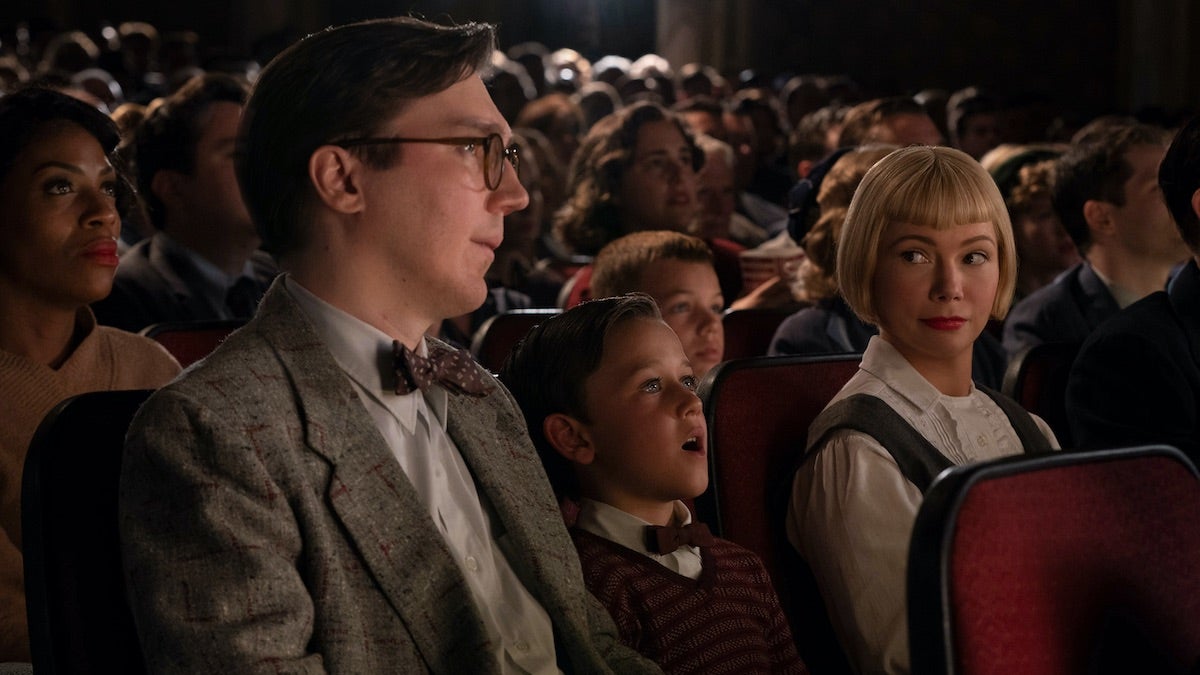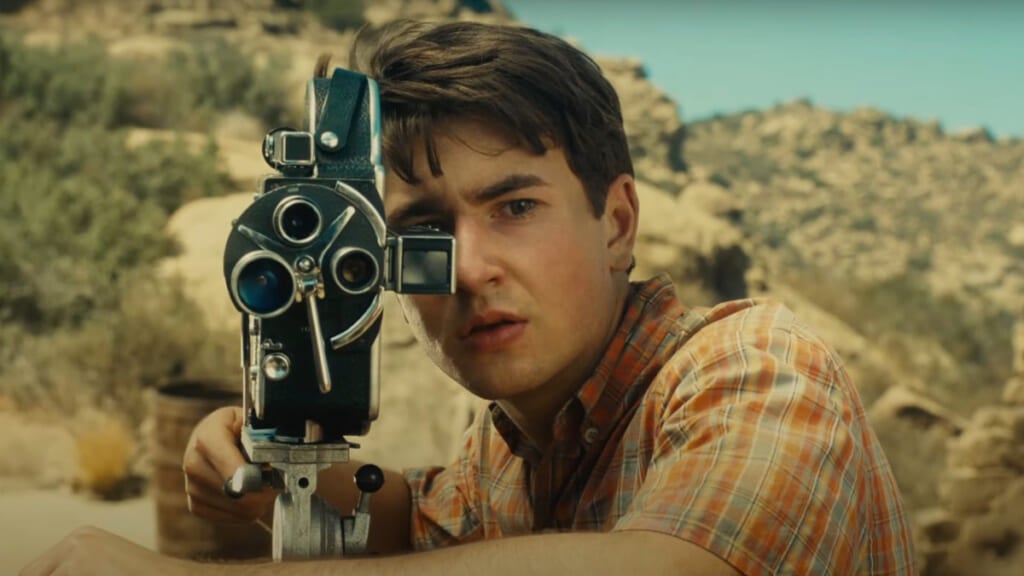
Note: This article contains spoilers for the entirety of “The Fabelmans.”
Steven Spielberg’s latest film stays true to its cinematic themes of family and family drama that he’s covered throughout his career. But with “The Fabelmans,” the acclaimed filmmaker finally turns the focus on what has been portrayed through metaphor, subtext or theme in many of his previous films: his own life. The film explores Spielberg’s unconventional upbringing and entry into filmmaking through the eyes of Sammy Fabelman (Gabriel LaBelle).
Much of “The Fabelmans” revolves around Sammy’s life at home with his artistic mother Mitzi (Michelle Williams), engineer father Burt (Paul Dano) and three sisters, who he often enlists to act in his home movies. But things take a sharp turn when his parents’ marriage begins to fall apart, uprooting his life in more ways than one.
Co-written by Spielberg and Tony Kushner, “The Fabelmans” takes direct inspiration from the director’s life. But how closely is the story patterned from real events, and what was left on the cutting room floor?
What’s the true story behind Spielberg’s parents’ divorce?
The central conflict in “The Fabelmans” is the divorce of Sammy’s parents and how it converges with his nascent filmmaking career.
Spielberg’s parents, Leah Adler and Arnold Spielberg, divorced when he was 19. In the 2013 documentary “Spielberg,” he and his sisters recall how the marriage started to break down after they moved from Arizona to California for his father’s work. When his mother announced that they were splitting up, his father took the blame.
During the interview, Arnold Spielberg said that he allowed the kids to think that he divorced Adler, rather than the other way around: “[I was] protecting her because she’s fragile, and she still is… I still loved her.”
As in “The Fabelmans,” Adler had struck up an affair with her husband’s best friend Bernie Adler, who was “like an uncle” to Spielberg and his sisters. In the film, Bennie (Seth Rogen) stays behind when they move west, and Mitzi falls into a dark depression, as Adler did in real life. Eventually, Leah and Bernie got married.

At the time of their parents’ separation, the details were not known to Spielberg or his siblings. He blamed his father for the relationship ending, and did not speak to him for 15 years. “I never told my dad I was mad at him, we never had angry words, but it was an estrangement that I created,” Spielberg said in the documentary.
The seismic impact of this event on Spielberg’s life is reflected in his work, with the absent father character and/or father-son strife appearing in many of his films including “Close Encounters of the Third Kind” (1977), “E.T.” (1982), “Indiana Jones and the Last Crusade” (1989), “Catch Me If You Can” (2002) and “War of the Worlds” (2005).
“The father-son obsession I’ve had in my movies obviously speaks to a great deal of feelings that I’d been carrying with me that I want to unburden myself of, and I have,” Spielberg said. They did reconcile eventually; Spielberg even dedicated 1998’s “Saving Private Ryan” to his father, who was a WWII veteran.
However, the real Spielberg and Adler had a happy ending beyond what’s shown in “The Fabelmans”: the pair reconnected many years later and remained close until Adler’s death in 2017.
Did Spielberg really discover his mother’s affair through movie footage?
One of the pivotal sequences in “The Fabelmans” takes place when Sammy is editing together footage he shot of a family camping trip. It turns out that his camera has inadvertently captured evidence that Mitzi has been having an affair with Bennie, his father’s best friend. Sammy shows his mother the footage but keeps it a secret from the rest of their family.
Similarly, Spielberg discovered the affair at age 16, three years before his parents got divorced. In a CBS Sunday Morning interview this year, Spielberg said “that was a secret that we shared for most of our lives,” and that his father never knew that he knew about the affair at the time.
Tony Kushner told TheWrap’s Drew Taylor that he had been encouraging Spielberg to turn the incident into a film since they first began working together in 2005.
“The whole time from ‘Munich’ on, I kept pushing him, ‘I think you should make a movie about this thing that happened,’ which he told me about on the first day of filming ‘Munich’, this thing that happened when he was a teenager with a camera and his parents,” he said.
Did Spielberg’s family own a pet monkey?
They sure did. At a pet shop in Northern California, Leah Adler laid eyes on a monkey that was apparently dying from depression. “So I come home driving my Jeep with a big cage in the back and a monkey in the cage,” Adler recalled in the “Spielberg” documentary, adding that the kids “freaked out.” (Arnold Spielberg said he liked the monkey.)
Adler recalled “Steve” saying, “You know, in a normal household, kids say, ‘Can we have a monkey?’ And the mother says, ‘Are you crazy?’”
In “The Fabelmans,” this addition to the family illustrates Mitzi’s zany, free-spirited personality as well as her declining mental health following the move.
As Spielberg put it, “The monkey Leah brought home was a grand distraction, but it was also a therapeutic companion for my mom, who was really at that time in our lives going through a major depression.”
Was Spielberg bullied as a child for being Jewish?
When the Fabelmans move from Arizona to California, Mitzi and Burt’s impending divorce isn’t the only source of Sammy’s unhappiness. A group of classmates immediately start bullying him, calling him “Bagelman” and defacing his locker with antisemitic slurs.
As Spielberg recalls in the 2013 documentary, his Orthodox Jewish upbringing clashed with the neighborhoods he grew up in, “where there were no Jews.” The “cultural divide” was so pronounced that his mother recalled kids standing outside their home, chanting “The Spielbergs are dirty Jews.”
In an attempt to assimilate, Spielberg distanced himself from his Jewish identity for years. He found his way back when his wife Kate Capshaw converted to the religion prior to their wedding in 1991. Spielberg went on to direct the Holocaust drama “Schindler’s List” in 1993. The following year, he founded the Shoah Foundation, an educational non-profit that preserves testimony about the Holocaust and other genocides.
Later, he said his childhood experiences with bullying informed the films he’d go on to make. “When I went through that semester of antisemitic bullying, suddenly those stories found a personal meaning for me,” he recently told THR. “And that did shape a lot of the stories I would tell in the future.”
Is the encounter between Sammy and John Ford based on a true story?
Yep. In a 2011 interview for “Cowboys vs. Aliens,” which Spielberg executive produced, he told the story of the time he met legendary director John Ford as a young man looking to break into the business. While visiting some cousins in California, he met with a television producer who got him a few minutes with “Jack”. The details of that encounter – down to the safari shirt, eye patch and chewed-up cigar – are exactly as they appear in the final scene of “The Fabelmans.”
Consistent with his portrayal by David Lynch, Ford had Spielberg walk around the room pointing out where the horizon was in the various paintings hung up on the walls. The advice he gave Spielberg that day, as conveyed in the film: “When the horizon is on the bottom, it’s interesting. When the horizon is on top, it’s interesting. When the horizon is in the middle, it’s boring.”
The anecdote ends, of course, with Ford telling Spielberg/Sammy, “Now get the f– out of here.”
















